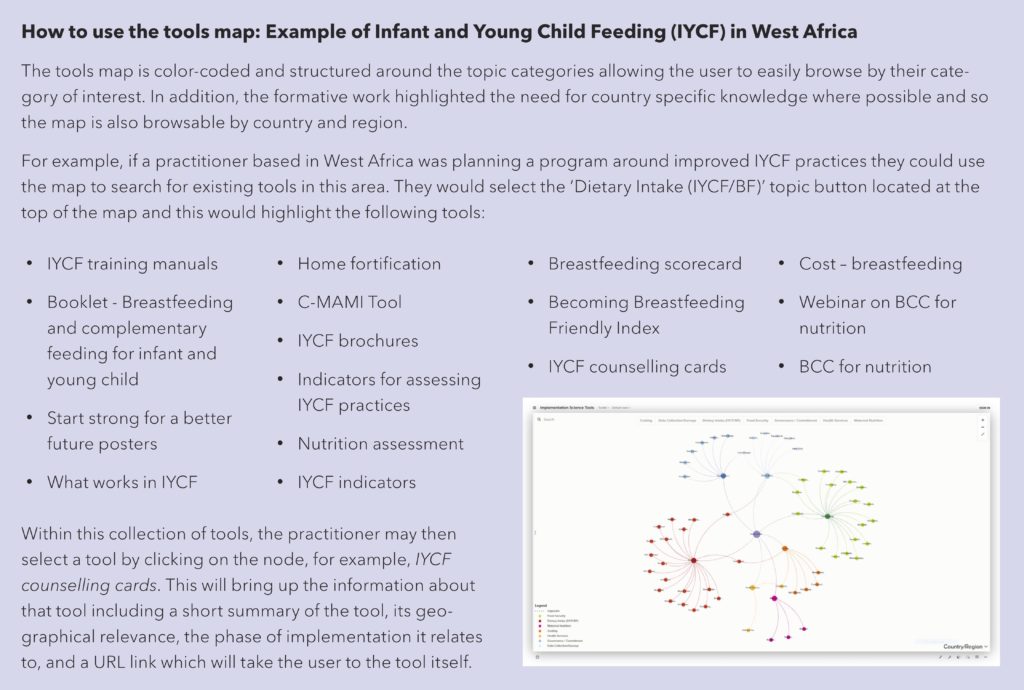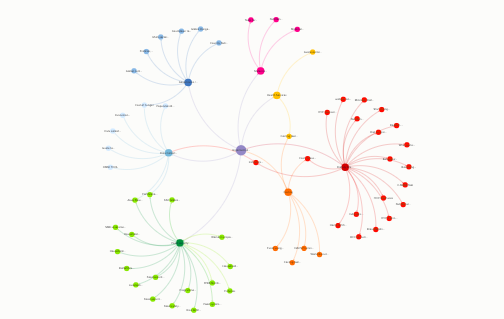Implementation in Nutrition: A Tools Map
We are grateful for the opportunity to have partnered with the International Food Policy Research Institute (IFPRI) and the SUN Movement Secretariat on the Knowledge for Implementation and Impact Initiative (KI3). This article describes the creation of a tools matrix to simplify access to implementation tools produced by various organizations. This report was compiled and published by Agriculture for Nutrition and Health, IFPRI. A PDF of this report can be found here.
Reproduced with permission from the International Food Policy Research Institute (IFPRI). www.ifpri.org.
Interested to learn more about KI3? Read our previous blog here or the SISN activities page here.
Looking for key resources on Implementation Science in Nutrition? Search our Knowledge Hub here.
Background
The Knowledge for Implementation and Impact Initiative (KI3) set out to strengthen the availability, access to, and utilization of implementation knowledge to accelerate progress in scaling up implementation and impact on nutrition. It was recognized that implementers need practical, curated, and hands-on implementation knowledge that is country specific and accounts for different social, political, and economic realities. In response to this need, KI3 systematically mapped the organizations and initiatives that already provide knowledge and tools on implementation for nutrition actions. The result was a database of entities that provide knowledge within the implementation science field. It includes 50 implementation knowledge providers, very few of which are physically based in low- and middle-income countries. To test the usefulness of the resources identified, we then piloted an approach to make them more accessible through the development of an online tools map. This pilot tools map could then provide the basis for interested parties to build upon if further funding could be made available.
Tools Map Development
We identified the tools provided (developed or hosted) by each of the entities in the systematic map. In total, 60 tools were identified, and a coding process was applied to generate a taxonomy. This coding process was data driven, with each tool being coded and a grouping exercise applied that generated 6 topic areas: costing, dietary intake, food security, governance, maternal nutrition and data collection/surveys. These topic areas are not exhaustive but include all the tools identified and can be added to the tools map should it be updated or further expanded.
Our aim was to design an interactive, user friendly, and visually engaging map that is practical and useful for the intended users, allowing program/policy designers and implementers to search and browse through the available tools. After consideration of different formats, we selected a web-based data visualization tool called Kumu. Kumu allowed us to map all the tools within their topic categories, capture the information about each tool, and show the links between the tools and different topic areas. The tools map can be found here.
Increasing the Accessibility of Tools Within the Map
Through links with the Society for Implementation Science for Nutrition (SISN) we explored the feasibility of hosting the tools on their knowledge hub repository, thereby increasing their searchability. SISN’s Knowledge Hub is a search facility designed to help users find key resources on implementation science in nutrition. It includes a wide range of materials from journal articles, papers, case studies, reports and presentations. The tools identified for the map have been classified by implementation phase, according to the SISN framework. This classification system allowed for the tools to be easily incorporated into the knowledge hub.
Recommendations
The systematic mapping exercise and tools map provide the first step in identifying and presenting the tools available to support implementers and planners working in nutrition. However, the work so far provides only a sample of the tools available within implementation science for nutrition. It is our vision that this initial mapping be further developed and updated to become more comprehensive, including tools from all regions.
To this end, there are some recommendations for consideration for the development of the map.
- Classification system
- As more tools are identified, it may be helpful to re-classify the categories or add sub-categories.
- Filtering by category
- As the map grows, it will become increasingly complex and more difficult to navigate. A possible solution would be to filter the view by category, allowing the user to more clearly see the tools presented within that category.
- Regular updates
- For the map to be as useful as possible, it would need to be regularly updated with new tools. This could either be by organizations developing the tools or by a hosting organization conducting regular searches for new tools.

Figure 1: Example of How to Use the Tools Map
The reception that this mapping has received from those with whom it has been shared to date has been extremely positive. The toolkit responds to a clearly articulated need from those working in-country on implementation within nutrition. It is our hope that this be taken forward and funded for further development and hosting to strengthen the availability, access to, and utilization of implementation knowledge to accelerate progress in scaling up implementation and impact on nutrition.
For more information you can find the full report ”KI3 Tools Map: A Case Study of Implementation Tools” here.
Access the Tools by searching the SISN Knowledge Hub and limiting your search by the category ‘Tool’.
Reproduced with permission from the International Food Policy Research Institute (IFPRI). www.ifpri.org.
Cite this article: A4NH (CGIAR Research Program on Agriculture for Nutrition and Health). 2020. Implementation in Nutrition: A Tools Map. Washington, DC: International Food Policy Research Institute.
A PDF of this brief can be found here.
Have an idea or a comment on any of the issues discussed above? We welcome your feedback – you can comment on this post on our LinkedIn feed or write to us at info@implementnutrition.org.





